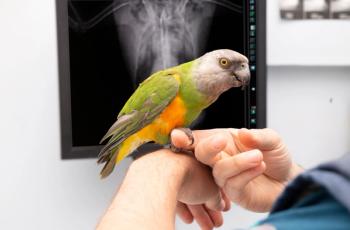
The price of knowledge when only 1 in 5 veterinarians respond
Robust participation from veterinarians in AVMA information gathering efforts will help target, eliminate inefficiencies in the market.All wish to possess knowledge, but few, comparatively speaking, are willing to pay the price. -Juvenal, Roman poetIread this quote and thought, how apropos! The American Veterinary Medical Association (AVMA) has surveyed its members three times this year, and fewer than one in five responded to the research requests.
All wish to possess knowledge, but few, comparatively speaking, are willing to pay the price.
-Juvenal, Roman poet
Iread this quote and thought, how apropos! The American Veterinary Medical Association (AVMA) has surveyed its members three times this year, and fewer than one in five responded to the research requests.
The first survey of the year, the AVMA Performance Survey, was sent out to 16,000 veterinarians and 5,000 veterinary students. A total of 3,340 responded. This survey was developed to assist the AVMA in identifying the relative importance of 11 major service areas and members' perceptions of how well the AVMA was performing in each of the areas. The strategic plan for AVMA over the next three years will be built around what the members told us through their responses.
(GETTY IMAGES/ALEKSANDR VASIL'EV)
The second survey was the AVMA Employment Survey. This survey was designed to determine the level of unemployment and underemployment in the profession and to help us understand the factors that contribute to both. It was a response to the 2013 AVMA Workforce Study conducted by the Workforce Advisory Group. Because there was considerable angst over the workforce study's findings of very low unemployment in the profession, the Workforce Advisory Group believed it was vital to get a more robust measure and, at the same time, attempt to identify contributing factors.
The third survey, the AVMA Compensation Survey, sought to collect information on veterinary compensation and practice financial measures and what factors may be associated with differences in compensation. This specific information is vital in assisting veterinarians in understanding how types of practice, location and other factors are associated with different levels of compensation. This specific information assists veterinarians in identifying the best opportunities for practicing veterinary medicine.
As a result of the response rate, I have to assume that four out of five veterinarians would rather be "free riders." That is, they have made no effort to provide the data needed for informed decision making-which would help the markets work more efficiently-but they want to gain the benefits from more efficient markets. In essence, they wish to possess the knowledge but are not willing to pay the price.
These may be the same veterinarians who already "know" what the AVMA should be doing, what the unemployment rate among veterinarians is, and how compensation changes across the profession. Many publicly state that these surveys are a waste of time, money and effort because the problem is already well-defined. And when the results of the surveys are analyzed, these same veterinarians are quick to note that they don't care how we manipulate the data, it doesn't change what they know to be the truth. That's unfortunate.
So why do we persist?
Experience with many markets-from simple exchange markets (e.g., a third-world village food market) to the most complex financial markets-has demonstrated that where information on prices and quantities is most readily available, both buyers and sellers obtain a higher level of net benefits. In most markets, obtaining information on prices and quantities is both difficult and expensive. Federal and state governments collect and disseminate market information at the public expense when they can demonstrate that the public benefits from the information.
When information is beneficial only to specific groups, non-government entities collect, process and sell the information. These entities exist in the veterinary profession. The sources of data include veterinary colleges, veterinary students, veterinarians, employers of veterinarians, producers of veterinary products, and consumers of veterinary products and services.
Clearly, veterinarians are a critical source of the data that describes this market. The more accurate this data, the more effective the data will be in driving efficient markets. More efficient markets will be less wasteful and thus produce greater net benefits to all market participants.
How you can help
The AVMA is working to reduce the size and number of surveys, but with the goal of collecting the data necessary to produce the best picture of veterinary markets. Over time, the factors that are creating inefficiency in the markets will be identified, along with solutions to reduce or eliminate these inefficiencies. The surveys take a look at veterinary education, veterinarians and veterinary services.
The AVMA is also working to build relationships with federal agencies such as the Department of Agriculture, Bureau of Labor Statistics, the U.S. Census and the Bureau of Economic Analysis to share and verify data. In addition, we're working to develop relationships with allied organizations (the Association of American Veterinary Medical Colleges, the American Animal Hospital Association, the American Association of Equine Practitioners and so on) and state veterinary associations to collect data that may be specific to those association members.
The road to better performance for all veterinary market participants runs straight through the collection, analysis and use of market information. This effort must be consistent and systematic and will require persistence and dedication to the goal of improved market performance. The AVMA will provide an update on both the efforts and outcomes of these surveys at the Annual Economic Summit on October 28. The success of the long-term effort will depend, to a large degree, on veterinarians who are willing "to pay the price."
Dr. Mike Dicks, director of the AVMA's Veterinary Economics Division, holds a doctorate in agricultural economics from the University of Missouri. He has worked in Africa on water delivery and energy production technologies and has served with the USDA's Economic Research Service.
Newsletter
From exam room tips to practice management insights, get trusted veterinary news delivered straight to your inbox—subscribe to dvm360.




